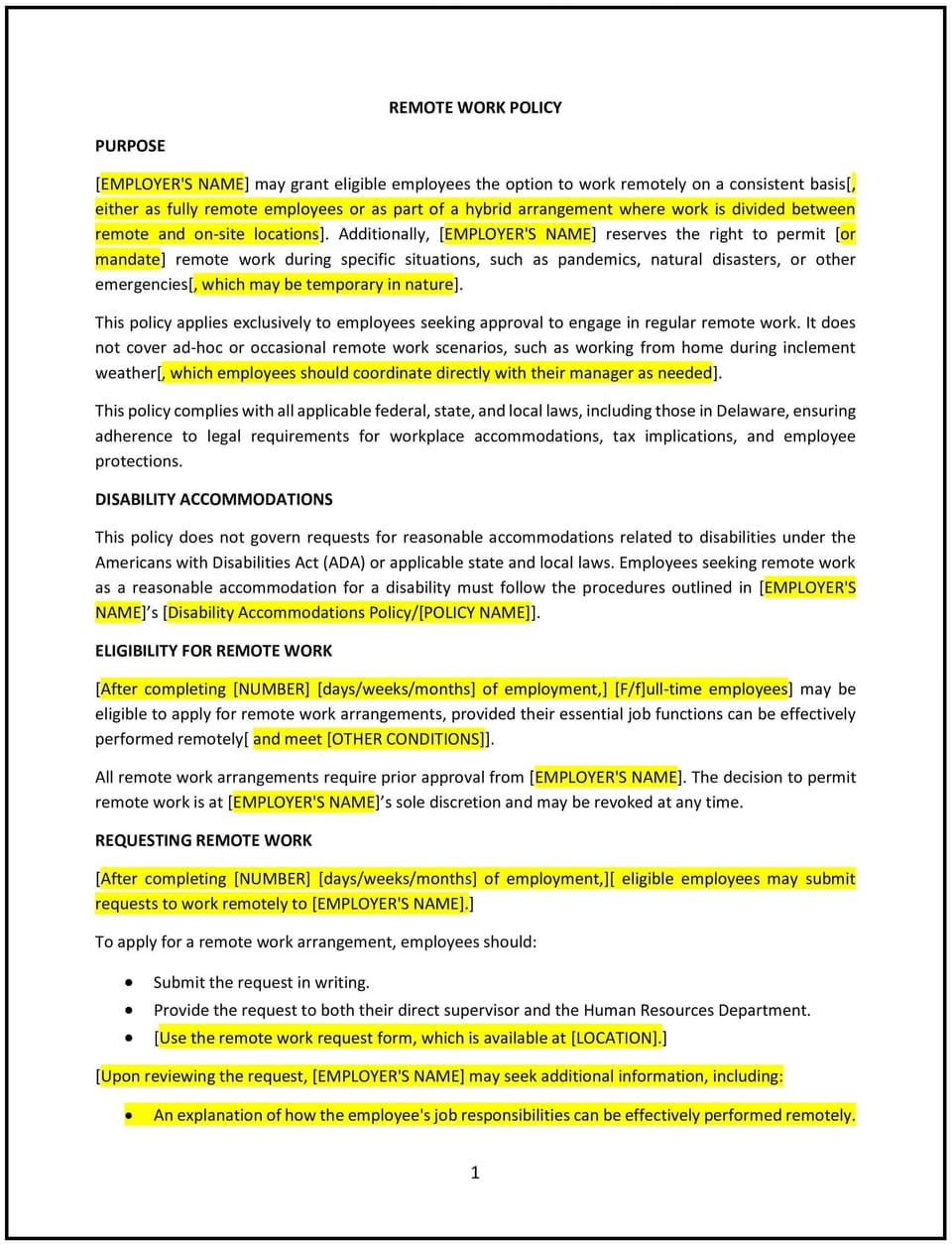Remote work policy (Delaware): Free template

Remote work policy (Delaware)
A remote work policy helps Delaware businesses provide clear guidelines for employees working outside the traditional office environment. This policy outlines eligibility criteria, work expectations, communication standards, and compliance requirements to ensure productivity and consistency across remote teams.
By implementing this policy, businesses can support flexible work arrangements, enhance employee satisfaction, and maintain operational efficiency.
How to use this remote work policy (Delaware)
- Define eligibility: Specify which roles or employees are eligible for remote work based on job responsibilities and business needs.
- Outline work expectations: Detail requirements for working hours, availability, and performance standards to maintain productivity.
- Establish communication protocols: Provide guidelines for regular check-ins, team meetings, and the use of collaboration tools to ensure effective communication.
- Address equipment and expenses: Clarify responsibilities for providing and maintaining work equipment, and specify what expenses the company will reimburse.
- Ensure data security: Include requirements for protecting company data, such as using secure networks, adhering to cybersecurity protocols, and safeguarding sensitive information.
- Monitor compliance: Set procedures for tracking remote work performance and addressing any issues that arise.
Benefits of using this remote work policy (Delaware)
This policy offers several benefits for Delaware businesses:
- Supports flexibility: Provides employees with the opportunity to balance work and personal responsibilities, improving morale and retention.
- Maintains productivity: Establishes clear expectations to ensure remote employees remain productive and aligned with business goals.
- Enhances communication: Promotes consistent collaboration and teamwork, regardless of physical location.
- Protects company data: Ensures that remote work arrangements comply with cybersecurity best practices and Delaware data protection laws.
- Reduces operational costs: Lowers expenses associated with maintaining large office spaces by supporting remote work options.
Tips for using this remote work policy (Delaware)
- Communicate the policy clearly: Ensure all employees understand the guidelines, expectations, and eligibility criteria for remote work.
- Train managers: Provide training on how to manage remote teams effectively, including performance tracking and communication strategies.
- Use collaboration tools: Leverage software to facilitate communication, track progress, and maintain team cohesion.
- Regularly review performance: Schedule check-ins and evaluations to ensure remote work arrangements are meeting company and employee needs.
- Update frequently: Revise the policy as needed to reflect changes in Delaware labor laws, technology, or business practices.
Q: Why is a remote work policy important for my business?
A: This policy ensures clear guidelines for remote work, supports employee flexibility, maintains productivity, and ensures compliance with Delaware labor laws.
Q: Who is eligible to work remotely under this policy?
A: Eligibility depends on job responsibilities, performance history, and business needs, as outlined in the policy.
Q: How can my business ensure data security for remote employees?
A: Require employees to use secure networks, implement multi-factor authentication, and follow company cybersecurity protocols to protect sensitive information.
Q: What expenses are covered for remote employees?
A: The policy may include reimbursement for specific expenses, such as internet costs or equipment purchases, based on company practices and budget.
Q: How often should this policy be reviewed?
A: This policy should be reviewed annually or whenever Delaware labor laws, technology, or company needs regarding remote work arrangements change.
This article contains general legal information and does not contain legal advice. Cobrief is not a law firm or a substitute for an attorney or law firm. The law is complex and changes often. For legal advice, please ask a lawyer.


